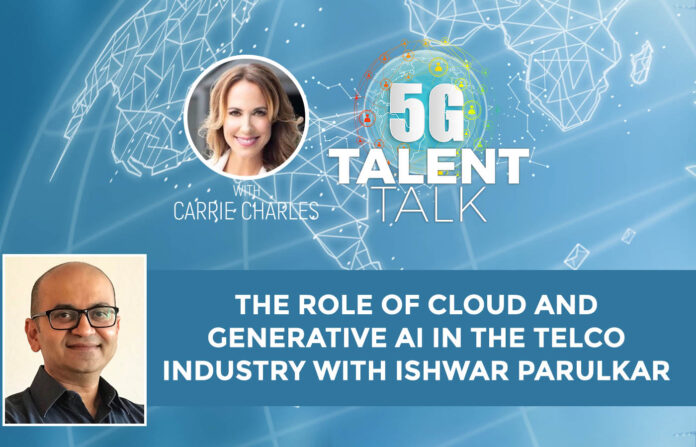Cultivating the workforce of tomorrow begins with embracing emerging technologies today. Join us in this eye-opening episode with special guest, Ishwar Parulkar, the Chief Technologist for Telecom and Edge Cloud at Amazon Web Services (AWS). Today, Ishwar takes us on a journey through the fascinating landscape of emerging technologies and their profound impact on the Telco industry. He touches on the evolution of Telco, software-defined networking, 5G, and mobile edge computing, providing a unique perspective on the industry’s rapid transformation. Ishwar also explores the impact of generative AI on the workforce and emphasizes the importance of upskilling and retraining. He highlights the need for awareness, education, partnerships, and a shift in mindset to navigate the transformative wave that generative AI and cloud technologies bring. Tune in now and be part of the exciting transformation happening at the intersection of technology and Telecom.
—
Watch the episode here
Listen to the podcast here
The Role of Cloud and Generative AI in the Telco Industry with Ishwar Parulkar
My special guest is Ishwar Parulkar. He is the Chief Technologist for Telecom and Edge Cloud at Amazon Web Services. Ishwar, thank you for joining me. I’m so excited about this conversation.
Thank you for having me. It’s a pleasure to talk to you.
You have a very interesting path to technology, telecom, and the seat that you’re in now. Please share that with us.
I’ve been in the tech field for over a couple of decades and have had the fortune of working for some of the most innovative companies and working on some of the key technology inflections that have happened. I started my career at Apple straight out of graduate school. I spent a few years there, and then I worked at Sun Microsystems, which no longer exists but was a high-flying tech company at that point. I moved to Cisco Systems and now I’m at AWS.
Every few years, as you can see from the path, I changed technology areas to keep up to date with the latest technology and try to do something different. I always brought experience from the previous space to the new space. In the last few years before AWS, I was at Cisco Systems, where I was the Chief Architect CTO for their telco business. In 2015, I was looking at some of the emerging technologies, software-defined networking, 5G virtualized networks, and mobile edge computing. I started some industry initiatives in that space but soon came to the realization that the cloud could transform this industry in a big way. I was convinced that this would happen at some point, which is what brought me to AWS in 2016.
I spent the first couple of years in AWS convincing them and the cloud experts about what the cloud could do for the telco and vice versa, educating the telco execs on what the cloud was capable of doing. That’s been my journey since joining AWS. It’s convincing the cloud to invest in telco to build some of the technology assets that we have now. We’re on our path to influencing and transforming the telco industry.
We’re going to talk about that a little bit more in a minute. First, describe your role in AWS in further detail.
I’m the Chief Technologist for Edge Cloud and Telecom at AWS. AWS is a horizontal developer environment that caters to all kinds of developers, but there are a few verticals that we have identified as very strategic and unique in certain perspectives. The go-to-market motions are unique. There is an ecosystem of partners, vendors, standards, alliances, and bodies. Some of the tech is very specific to that vertical. Telecom is one of those verticals that we are focused on, and I played the role of the CTO for this vertical.
In that role, my job is to define the technology strategy and look at new products, new services, and enhancements to existing services, specifically for telecom use cases and workloads, as well as working with execs from our customers, the telcos, to understand their business strategy, what their pain points and friction points are, and then bring that back to the company to start looking at how we can help solve those problems. Another piece of my role is evangelizing and explaining the value of the cloud and what we are doing and external forums, keynotes at conferences, participating in standard bodies alliances as well as doing things like this show.
Tell us. How is cloud helping telcos? What will be the impact of cloud to the entire industry?
The cloud has a pretty big role to play in transforming telecoms and we’re looking at a few pillars. I can categorize them into three key pillars from a technology perspective in terms of what we’re doing with telcos. The first one is cloud-refined networks. This is about running telco networks, operating, and building them using cloud as an infrastructure. If you look at what happened in the telco industry in the last decade, network appliances that used to be hardware-based, like routers and base stations, became virtualized.
They are now implemented as software applications running on servers. That’s the transformation that happened years ago. What we’re doing is taking that step further by enabling telcos to run these network appliances as software application on cloud. We have the regions build out what we call the edge cloud, which is cloud presence on the edge of the network close to metros and the users. Across this whole continuum of cloud infrastructure, you can deploy network applications and build out a mobile network.
That’s one big area, and this has the benefits of lower cost of ownership and operational simplicity. The way we operate the cloud now is very different than how networks are operated. The cloud is 24/7. You don’t bring down customers when you’re doing an upgrade. It’s all under the hood, so we’re bringing all of that to networks by running these networks on the cloud. That’s one key area.
The second one is around monetizing their assets. One of the things that telcos have had a challenge with in the last couple of decades is they have become more of a connectivity player-only, where a lot of the value has moved to over-the-top players, where the players stream data, run applications, and build applications on top of the network. We are helping telcos to recoup some of that value by getting into new verticals and building new services.
We’re doing this in a couple of ways. One is bringing the cloud to the edge of the network, so that way, you can have applications running as part of cloud infrastructure, which is embedded in telco networks. Second, building private networks for enterprises that can run on AWS as a managed service, but telco offered them to verticals like healthcare, manufacturing, and mining industries. This opens up new businesses for them. That was the second area.
The third big area is around data, artificial intelligence, and machine learning. This has become pervasive in all industries. Telcos have a lot of valuable data. They have data from customers, the applications that run, the type of devices that I run, as well as data from the network itself. It’s not been tapped to the fullest extent.
What we are doing is helping telcos become more data-centric. It starts with modernizing the data platform, being able to manage data using modern cloud infrastructure, and layering artificial intelligence and machine learning technologies on top of that data to gain insights, build new offerings, improve operations, and other such things. It’s got across the board. We are seeing various levels of traction and adoption in the three different areas that I mentioned. It’s exciting and encouraging to see how they have adopted cloud as one of the key enablers in their transformation journey.
I’m glad that you brought up artificial intelligence, Ishwar. AI is transforming our world everywhere. How will generative AI be utilized in the telecom industry? Maybe you can add some color to the difference between generative versus traditional AI.
You rightly pointed out that artificial intelligence and machine learning are the next big transformation in the tech industry. I’ve seen several of these over the last few decades. This is clearly a big one. This has been happening for the last decade or so, where there’s been a very strong interest in the development of technology to make this practical, useful, and cheap to implement. That’s why you’ve been seeing a lot of attraction in this area. Machine learning models are based on the prediction or classification of data. Generative AI is a huge step forward in this whole space. It’s happened in the last few years. ChatGPT made a compelling case for its value, but it’s been happening for a few years, this whole transformation in terms of generative AI.
Artificial intelligence and machine learning are the next big transformation in the tech industry.
The big difference with generative AI is three things. One is compute. It has become much cheaper and more affordable. You need lots of computing to train machine learning neural network models. That price point has exploded in terms of becoming very affordable to run very large models. That’s number one. The second one is the amount of data available now. There’s a very large particle of data available, and that’s been increasing over the years. It’s reached a very critical point where there’s so much data that you can build intelligence systems.
The third one was a fundamental innovation in the neural network architecture called the Transformer Architecture, which allows you to generate new content based on training very large models. As I mentioned, the traditional techniques are more of predicting something. They’re about classifying. This is about generating new content. It’s more creative in that sense. You can generate new text or new images based on some simple prompts.
As you can see, with ChatGPT, which is the most compelling user-friendly use case, this is super powerful. With a simple prompt, you get a whole bunch of advice, a new text that’s created, essays that can be written, and so forth. That’s just one use case and application. If you scan this technology to multiple domains, there are a lot of applications. It’s a very powerful technology and a big transformation in the machine-learning space.
This has got to come with some challenges. What are the challenges that you see with generative AI?
As with any new technology, there are challenges. Usually, the compelling value part of it is seen and noticed first, which takes hold of folks’ imagination, which leads to more development and so forth. Some of the reality challenges set in. We are looking at some challenges of this technology. There are three primary challenges. One is security. The other one is around data privacy, and the third one is around ethics.
Security and data privacy are interrelated, but it’s fundamentally about how you maintain the privacy of data that is used to train these models. These models are trained on a large amount of data. If you look at ChatGPT, it’s trained on a whole bunch of documents that are publicly available. The question arises in terms of when you want to train it with your data. When a customer, let’s say telco, wants to use their own data to train it. How does that data get handled in the model? Does it get reflected in the output? If somebody else uses the same model, is there a leakage of that data? Does it compromise the privacy of their data in terms of other customers using it?
There’s a challenge of that nature. It’s how you use the data and enable the training of the models through that data without compromising the privacy or leakage of data to other interfaces and other customers or other users of the foundation model. That’s a big space where enterprises and telcos are very concerned and keen on making sure these problems are handled. There’s the ethics question as well.
As I mentioned, this is about generating new content. These are machines and algorithms. They can come up with content that’s offensive and sometimes incorrect. There’s this thing called hallucinations with generative AI, which is, essentially, the answers wrong, but it gives such credibility that you’re likely to believe it. There’s that. There’s hallucination, then there’s offensive content. There can be biases that can creep in, racial bias, or gender bias. All of these things need to be handled.
The regulatory bodies are on top of it, trying to figure out regulations that will need to be applied to the space. More importantly, you would need tools for helping developers to manage all of this, manage data privacy, and make sure that applications are secure and the output is ethically correct or ideas to ethics and things like that. That’s where we are very focused on from an AWS perspective because we are a developer environment. If you have to look at it at one level, we don’t just build foundational models. We build capabilities for application developers to develop applications. We’re looking at a lot of these things to handle the challenges that we’re seeing coming up in generative AI.

You said something important that we’re going to need developers to do this. That brings me to the next question of people. How will the workforce be affected by this new technology? I know that one thing that is on all of our minds in society now is, will we need less people? That’s the question. Is it going to be less people? Will it be more people? Do we all need to upskill or re-skill, as you did yourself and your career? You said, “I’m going to learn about something new. I’m going to get to take this road because I see the future.” Do we all need to be sitting there? I know that’s a lot of questions in on, but let’s start with how the workforce will be affected.
It’s very clear that AI, generative AI in particular, increases productivity. It will automate several of the tasks that are being done manually now by a lot of people. To me, this only increases the opportunities and the economic value that is greater than society. You start to look at technology transitions in the past. If you go back to the Industrial Revolution or even personal computers, when they came up in the 1980s, initially, there was a fear. “This is going to take away a job. You don’t need people anymore.”
What the Industrial Revolution did was create a massive economy where there was more opportunity and more jobs, the same with personal computers. I firmly believe that this is a big opportunity for improving productivity and for the economy to grow and get into bigger things that society can do once we have some of these technologies handling some of the tasks that are more manual.
The key here is upskilling yourself, the companies, and individuals as well as corporations in terms of developing new skills. It is accepting firstly that this transformation is going to happen and change the way a lot of things will be done, and adopted, then start retraining folks to understand the technology and get into higher levels of skills that can leverage this technology to build even more interesting applications, products, and services and get the best out of what the human brain is still capable of.
We need to, as you said, prepare the workforce for this transformation. I know that AWS has tools. The Innovation Center, we talked a little bit about it. Can you discuss how we would prepare the workforce and also what’s available throughout AWS?
This is something we at AWS put a lot of emphasis on. We talked about AI and machine learning here now. Even the cloud was a big change for a lot of people. When the cloud came about, if you roll back a few years, it was a very new way of developing applications that required training. We’ve been doing this from the inception of the cloud, this certification and training programs that are geared toward training people in cloud skills and how you program and build applications using cloud services.
As an example, one of the efforts and goals we have is to train 29 million individual people through freely offered AWS training programs to become experts in cloud development skills. This is a goal we have set for general cloud skills itself. In the AI space, we created a center called the Innovation Center. This is a center that has experts ranging from strategists to machine learning engineers to machine learning scientists, solution architects, product managers, and business development folk who will help customers and other developers who want to adopt this technology understand this technology.
Not only understanding this technology but thinking through what the strategy should be, what type of products they can develop, and helping them through their journey of even developing some of these products and applications using this technology. This is beyond the products and services we built. We have products and services that we are building in generative AI. We have bedrock, which is a managed service to help build generative AI applications. We have our own applications like CodeWhisperer, but this is on top of that. This is for training, educating, and helping customers and developers go through the journey of transforming their companies using this technology.
You said 29 million people is your goal to train and educate. That’s significant. You’re making such an impact in helping the world upskill. You’re helping to solve this potential challenge or problem. I love that. I’m going to be one of those 29 million. I’m going to raise money because I’m fascinated with this, and it’s coming. We need to be prepared. That leads me to my next question, which is preparing the workforce is one thing, but how should telco leaders be preparing themselves and their organizations for what’s right around the corner or what’s here now?
It’s a very fundamental when there’s a technology shift to be aware of it and understand and adopt it. What leaders need to do here is firstly accept that this is going to be a big change. It’s going to transform not only the telco industry but several Industries. That’s number one. The second one is getting educated on the technology. There are different levels. There is AWS, which is the foundation of some of the technology.
It’s very fundamental when there’s a technology shift to be aware of it and really understand and adapt it.
There are people who are building foundational models. Telcos are not going to do any of these. They need to understand that technology in terms of what the value is, what the trade-offs are, and how they can use it to their advantage. That’s the second piece. It’s understanding the technology. The third one is building bridges and partnerships with companies like AWS and others who are building foundational models to start engaging in terms of solving business problems, improving productivity, and finding use cases where it makes sense for them to adopt this technology.
Lastly, it’s about changing the internal mindset and these new technologies. Telco is a more traditional sector that has been around for several decades. It’s very successful and has transformed society in a large, significant way, but this is new stuff. There needs to be a change of mindset. We saw this with the option of the cloud that they had to change the mindset within the company, their engineers, and their operational folk to understand and adapt to how the cloud works. The same thing needs to happen here, which is changing the mindset. Related to that is what we discussed, which is retraining, getting these employees to understand the new technology, and developing new skills. There’s that transformation of the workforce that also needs to happen along with this.

I’m feeling inspired. There’s a lot of possibility ahead of us. Ishwar, this is been a fantastic conversation. I’ve learned a lot, and I want to thank you for coming on the show.
It’s been a pleasure. I enjoyed the conversation and I hope your audience as well enjoy this.
I’m sure they have. Thank you. We’ll talk soon.
Thank you.
Important Links
About Ishwar Parulkar
 Ishwar Parulkar is the Chief Technologist for Telecom and Edge Cloud at Amazon Web Services. In this role he is responsible for setting AWS technology strategy, defining new cloud services and leading initiatives to enable AWS’ edge cloud offerings and next generation telecom networks and services.
Ishwar Parulkar is the Chief Technologist for Telecom and Edge Cloud at Amazon Web Services. In this role he is responsible for setting AWS technology strategy, defining new cloud services and leading initiatives to enable AWS’ edge cloud offerings and next generation telecom networks and services.
Prior to AWS, Ishwar was a Distinguished Engineer at Cisco and Chief Architect for business units responsible for routing, mobile packet core, small cell and network orchestration products. He was involved in building the first LTE networks for several tier-1 and tier-2 telecoms across the world based on these products. He was a founding member of industry-wide initiatives around mobile edge computing and 5G and the conviction that cloud technology can transform the telecom field brought him to AWS in 2016. Before his stint at Cisco, Ishwar was a Distinguished Engineer at Sun Microsystems where he led the design of SPARC architecture-based data center computing technology and products, including the first multi-core processor systems and first compute virtualization platforms in the industry. He started his career at Apple, where he worked on the Mac desktop/laptop product lines and on the Newton PDA technology, which had the seeds of the iPhone revolution.
Ishwar holds an M.S. from Vanderbilt University and a Ph.D. from University of Southern California. He served for several years as a member of the Industry Advisory Board of University of Southern California. He holds several dozens of patents, has published over 25 papers in IEEE/ACM journals/conferences and served as Program Committee member/chair for IEEE/ACM conferences in networking and computing. In 2017, Ishwar was elected a Foreign Fellow of the Indian National Academy of Engineering for his excellence in and seminal contributions to the field of mobile networks and data center computing.
Love the show? Subscribe, rate, review, and share!
Join the 5G Talent Talk Community today:

